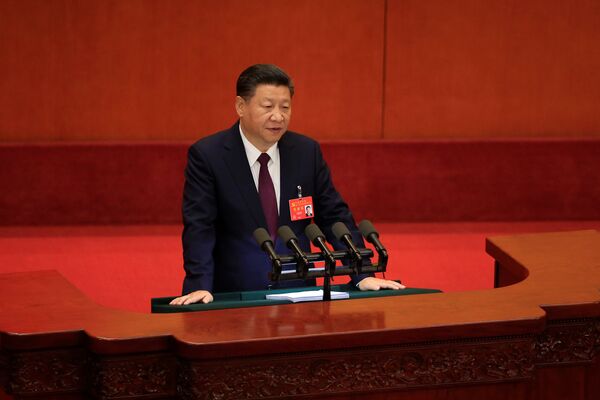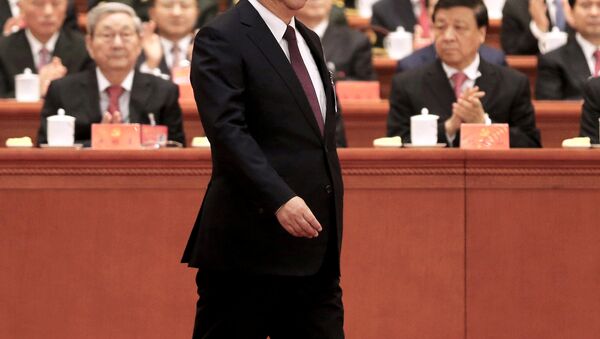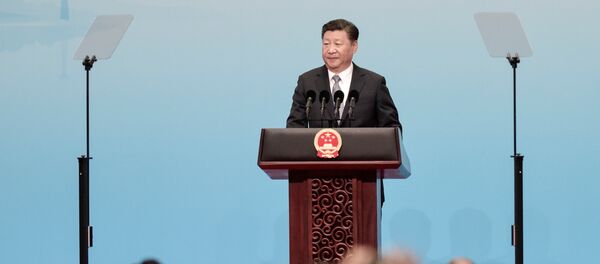The Chinese miracle of sustained hyper economic growth, lasting over three decades, has under Xi Jinping's leadership since 2012 been joined by a robust foreign policy with the purpose of solidifying and increasing China's ability to repel Washington's hegemonic objectives in the region.
During the course of a marathon speech lasting over three hours, in which "national rejuvenation" was the overarching theme, Xi outlined an ambitious vision of China's economic, cultural, military, and geopolitical development over the coming decade. In the process of doing so, he left no doubt that rather than relinquish or in any way weaken its hand on the levers of power, the Chinese Communist Party will remain in full command as the ballast of cohesion within and the pillar of strength required to navigate the rapids of an ever-changing world without.

After decades of "tireless struggle," Xi Jinping told delegates, China "stood tall and firm in the east," before further on proclaiming:
"The Chinese nation… has stood up, grown rich, and become strong — and it now embraces the brilliant prospects of rejuvenation… It will be an era that sees China moving closer to centre stage and making greater contributions to mankind."
Since assuming coming to power back in 2012, Xi Jinping has led China down an unapologetically nationalist path, determined to assert a dominant regional position, especially in relation to Japan, while, as mentioned, acquiring the military means and ability to deter Washington's attempt to place a cordon sanitaire around it.
What has consistently been underestimated in the West is the antipathy in which Beijing holds Japan, rooted in historical factors but which also has a contemporary context with the ongoing territorial dispute between both countries with respect to the Japanese-controlled Senkaku Islands (Diaoyu Islands in China) in the East China Sea.
Anti-Japan feeling in China extends way beyond the country's political leadership and nomenklatura. In his 2017 book, Everything Under the Heavens, Howard French points out that to "turn on the television in China is to be inundated with war-themed movies, which overwhelmingly focus on Japanese villainy. More than two hundred anti-Japanese films were produced in 2012 alone, with one scholar estimating that 70 percent of Chinese TV dramas involve Japan-related plots."
Those familiar with the brutal history of Japanese imperialism, and the unresolved issues stemming from Japan's occupation of China in the 1930s and 40s, will appreciate why Chinese nationalism and anti-Japan sentiment walk hand in hand in 2017.
Fueling this sentiment further is the perception of Japan as a cat's paw of Washington in the region, most obviously with regard to China's other territorial dispute over the strategically important Spratly Islands in the South China Sea. Multiple nations in the region claim sovereignty over this small group of islands, which have been claimed by Beijing. The US supports those rival claims with Tokyo's support.
The controversy over China's enlargement of the islands through an extensive dredging operation, establishing military installations to leave no doubt of its seriousness in defending them, is a key source of tension between Beijing and Washington in the current period.
This being said, and despite China prioritizing the upgrading, modernization and expansion its military capability, Beijing's strength remains rooted in its remarkable economic growth and development. It is here where the country continues to astound a Washington Consensus underpinned by a neoliberal model that the 2008 financial and economic crash exposed as a corpse. In contrast, China's statist mixed market alternative has been responsible lifting 500 million of its people out of extreme poverty over the past three decades, to the point where urban poverty has now been completely eradicated.
This of course is not to suggest that China — the world's most populace country at over 1.3 billion people — has succeeded in surmounting the contradictions sown by such a phenomenal rate of economic growth. On the contrary, inequality and corruption remain serious problems within Chinese society, both of which Xi Jinping addressed in his speech. But when related to the state of underdevelopment the country was floundering in prior to it opening up in the late 1970s, its successes and achievements outweigh its weaknesses and failures by a considerable margin.
This brings us to the role of the Communist Party in China. The main critique of China in the West concerns its lack of democracy and liberal democratic political institutions — though here we discern the usual Orientalist rendering of non-Western polities, the starting point of which is that the world exists on a blank sheet of paper in which context in the form of a country and region's specific historical, cultural, geopolitical specificities are conveniently and purposely abstracted.
Martin Jacques makes the pertinent point that democracy "should not be regarded as some abstract ideal, applicable in all situations, whatever the conditions, irrespective of history and culture, for if the circumstances are not appropriate it will never work properly, and may even prove disastrous."
Jacques, a respected China expert, is absolutely right. Of more importance than democracy in developing countries, he further points out, is economic growth and social cohesion, both of which are inextricably linked to security and stability.
For those who hanker for a world underpinned by multipolarity rather than the unipolarity over which Washington has presided these past few decades, Xi Jinping's speech will have sounded a welcome note of assertion and strength. Among neocons it will have induced the dread associated with impending irrelevancy.
The views expressed in this article are solely those of the author and do not necessarily reflect the official position of Sputnik.
Check out John's Sputnik radio show, Hard Facts.





